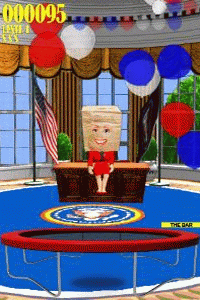Opinion: Apple is taking a bite out of free expression
Games censorship a growing problem as Apple seeks to polish up App Store

Censorship is alive and well in the free world. It's not found in our public squares or cable talk shows, but in our pockets. iPhone games have come under increasing scrutiny by Apple as the number of titles hitting the App Store continues to grow.
Waving the banner of decency, the company has rallied against objectionable games, rejecting drug-dealing titles like Underworld and Prohibition 2: Dope Wars for reasons of indecency (though not, strangely, Prohibition 1: Bootlegger, or the thinly veiled Candy Wars).
However, the vague pursuit of quality has devolved into digital demagoguery and ambivalence to limits placed on expression. Drug dealing may be straightforwardly controversial (even if violence isn't) but what's so wrong with a game in which President Obama jumps up and down on a trampoline?
The Apple stanceAlthough Apple refused to respond to requests for comment about the company's standards for what constitutes objectionable content, we managed to secure text outlined in the non-disclosure agreement required by all iPhone developers.
"Applications must not contain any obscene, pornographic, offensive or defamatory content or materials of any kind (text, graphics, images, photographs, etc.), or other content or materials that in Apple's reasonable judgment may be found objectionable by iPhone or iPod touch users."
To the casual observer, the intention seems benign: who among us would want the App Store to be filled with indecent material? It's already overflowing with hundreds of worthless games, the last thing any iPhone/iPod touch owner wants is a few more hundred sleazy titles clogging up the works.
Marketing Shift blogger Matt O'Hern supports this position. "I agree with Apple's decision to filter its items for sale in the app store. To maintain a family friendly feel and to avoid lawsuits, Apple is taking the moral high ground regarding adult-themed applications."
The censorship
What O'Hern fails to recognise, however, is that the question of censorship has nothing to do with the moving target of morality. If Apple wants to avoid lawsuits, its should work to squash copyright infringement from copycat games instead of censoring legitimate expression.Apple's non-disclosure agreement offers a nebulous set of criteria for what qualifies as objectionable content, and it singles out "Apple's reasonable judgment" as the measure of discrimination.
This essentially gives Apple the ability to suppress any app that it deems offensive, making it subject to indefinite delay and stripping the developer of rights both explicit and implicit in the agreement.
Harvard University Professor of Computer Science Harry Lewis contends that protections against censorship extend even to those contracts that do not explicitly grant them.
He writes in The Chronicle Review (Vol. 55, Issue 19), "Is 'censorship' even the right concept when protection is never part of the arrangement? In this case, the answer is yes ... Because of 'network effects' - the more people who use something, the more others want to use it - many information services develop toward monopoly status."
In other words, the fact that Apple is a private entity does not necessarily afford it the right to censor content created by its partners.
The precedent
That position is backed by a ruling issued by the US First Circuit Court of Appeals in 1988. Redgrave versus Boston Symphony Orchestra established precedent for breach of contract when a corporation makes a concerted effort to censor the parties that hold contracts with it.While a corporation can exercise its own freedom of speech by not entering contracts with parties that want to create content the company deems objectionable, a corporation cannot back down from the terms of a contract simply because the other party acts in opposition to the values of the corporation.
Apple has a right to not grant development kits, but it shouldn't then deny publication of an application it had knowledge of when entering into an agreement with a developer.
If Apple knows a developer intends to create an application it would find objectionable, then the company should not grant development rights. Apple shoudn't reject an application after the fact.
Yet, that's exactly what Apple is doing. South Park Digital Studios sought a development license to create an application assembling clips and other props from its immensely popular South Park animated series.
Knowing full well what was intended, Apple granted a development kit and then rejected the application as offensive. Ironically, Apple hosts episodes of South Park on iTunes without any objection to the content.
The call to arms
To debate whether South Park is offensive isn't the point. Countless other apps have been denied under the questionable claim of obscenity, while others are published without problem.iSperm and I Luv 2 Fart sail through, but Knife Music, MyShoes, Obama Trampoline, and even Tweetie are rejected for objectionable content. The varying scope of these titles proves the vagueness of Apple's standard. Why is a happy-go-lucky President Obama more offensive than flatulence?
Censorship on this scale is not an appropriate means of protecting Apple's users from objectionable content. This debate has already occurred with regard to music, motion pictures, and television: each and every time the solution lies in rating material to empower consumers to make their own decisions about content and not prevent release of said material.
We, as gamers and individuals driven to make our own choices, shouldn't be too lax in our response to Apple's actions.
To those who would argue that censorship doesn't exist and action isn't needed, just look at the brown paper bags covering the faces of political figures in Obama Trampoline. Do you really want to play a game in which the characters need to wear bags over their heads?
